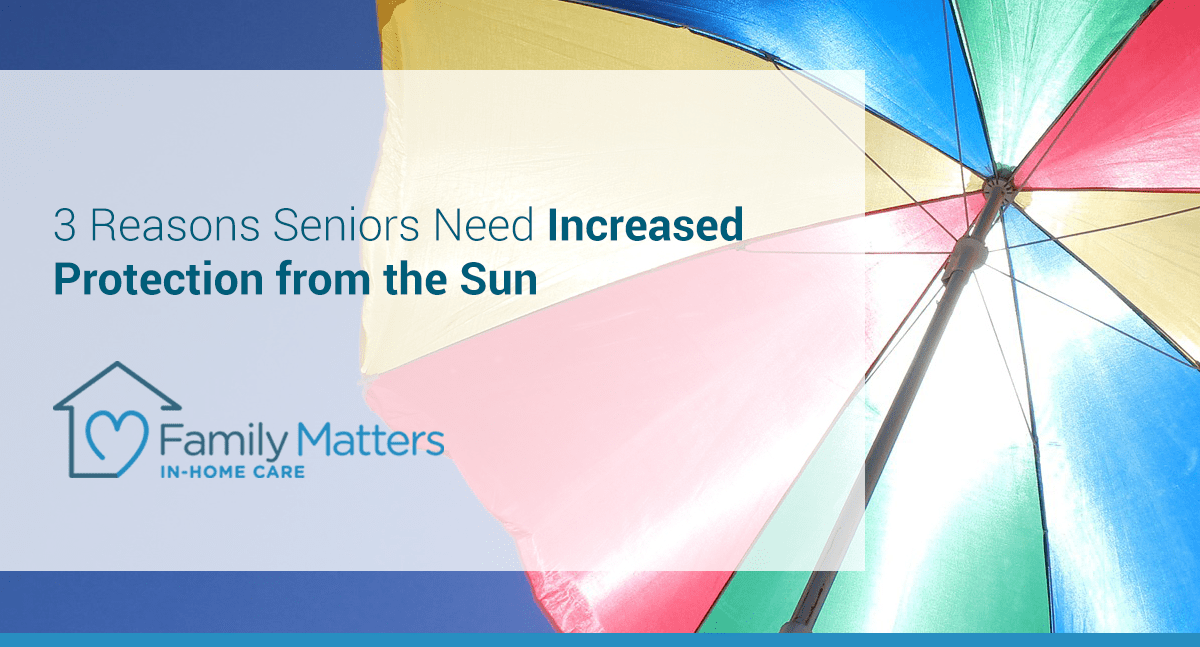
3 Reasons Seniors Need Increased Protection from the Sun
As we age, our skin ages too. It experiences a lot over the years, from cuts and bruises to rashes and sunburns. All of those things age the skin and make it more susceptible to damage from the sun which causes the majority of skin cancer (melanoma) cases. In fact, the American Academy of Dermatology says that skin cancer is the most common cancer in the United States. One in five Americans will develop skin cancer in their lifetime. It’s important to protect skin from the sun at any age and becomes even more important in senior years. Here are three reasons why seniors need increased protection from the sun:
1. Older people are more susceptible to skin cancer
- Caucasians and men older than 50 have a higher risk of developing melanoma than the general population.
- The incidence in men aged 80 and older is three times higher than women of the same age.
- By age 65, skin cancer rates in women are twice as high as in men.
Thinner skin, reduced immune systems, poorer healing capacity and less hydration all contribute to an increased risk of skin cancer.
2. Skin damage is cumulative
Throughout our lives, unprotected exposure to the sun’s damaging ultraviolet (UV) rays can increase the risk of skin cancer. The Skin Cancer Association says “Both sunburns and suntans damage our skin’s DNA, breaking down the skin’s tissues so that it ages before its time, and producing genetic defects that can lead to skin cancer. For example:
- Even one blistering sunburn during childhood or adolescence can nearly double a person’s chance of developing melanoma.
- Experiencing five or more blistering sunburns between ages 15 and 20 increases one’s melanoma risk by 80 percent and nonmelanoma skin cancer risk by 68 percent.
- Exposure to tanning beds increases the risk of melanoma, especially in women 45 and younger.
- Researchers estimate that indoor tanning may cause upwards of 400,000 cases of skin cancer in the U.S. each year.
On top of that, research now shows that the majority of our exposure to the sun occurs after the age of 40. According to the Skin Cancer Foundation, “This later exposure is often what kicks on skin cancers, so sun protection remains vital throughout our lives.” It bears repeating that the proper use of sunscreen becomes extremely important as we age. The Centers for Disease Control and Prevention recommends:
- Use SPF 15 or higher.
- Look for “blocks UVA and UVB” or “broad spectrum” on the label.
- Apply liberally (minimum of 1 oz) at least 20 minutes before sun exposure.
- Apply to all exposed skin. Remember to apply to ears, scalp, lips, neck, tops of feet, and backs of hands.
- Reapply at least every 2 hours and each time you get out of the water or sweat heavily.
- If you are also using bug spray, apply sunscreen first and bug spray second. Sunscreen may need to be reapplied more often.
- Throw away sunscreen after 1–2 years.
3. The skin ages in two ways and that increases the risk of skin cancer
The skin ages intrinsically and extrinsically.
Intrinsic aging
Intrinsic aging is chronological aging; the number of years you have lived. It includes factors that may impede the skin’s ability to heal. For example, cardiovascular disease and diabetes restrict blood flow to the skin. That can impact how healthy it is and how well it can heal and protect itself.
Extrinsic aging
Extrinsic skin aging is caused by factors in the external environment in which you have lived and worked. They include exposure to ultraviolet (UV) rays from the sun and tanning beds, chemicals in the workplace, immune system disorders and various types of pollution.
It’s impossible to go back in time and improve sun protection, but it is possible to protect the skin now. Among the best strategies are:
- If you go outside, stay in the shade, especially during midday hours between 10 am and 4 pm
- For seniors, it is best to stay in the air conditioning when it is hot outside. Heat stroke is a serious health matter
- Wear sunglasses that block both UVA and UVB rays (the label will state the type and level of protection)
- Wear light, loose fitting clothing, wide brimmed hats and sunglasses that cover the entire eye to the top of the cheekbone.
- Stay well hydrated. Seniors can become dehydrated quickly. Make sure your senior loved one drinks plenty of fluid, and eats fresh fruits and vegetables (that have a high water content). Reduce or eliminate caffeinated and alcoholic drinks which can be dehydrating.
It’s a good thing to sit in the sun and enjoy it’s warmth. However, it’s best to do it in the early morning or late afternoon hours when it’s rays are less harmful. Encourage your loved one to get outside to take a walk and get fresh air, just make sure they are well protected from the sun when they do so.
If you or your family member is considering in-home care as part of a plan to age in place, contact Family Matters In-Home Care today for a free consultation. Our team is dedicated to supporting your family and helping older adults enjoy life in the comfort of their own home for as long as possible.
Some of the services offered by Family Matter In-Home Care include: Alzheimer’s & Dementia Care, Bed & Wheelchair Transfer Assistance, Companionship, Housekeeping & Meal Preparation, Personal Care, Recovery Care, and Transportation.
